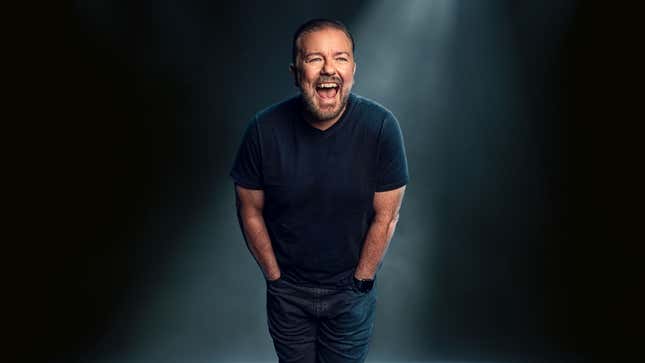
Ricky Gervais no longer does comedy. He does grievance. Two minutes into his latest, hourlong outrage bait for Netflix, Armageddon, he’s talking about the backlash he generates and how he’s putting “woke” in his Twitter bio. Later, amid adlibbing about Chinese people eating dogs, taking an applause break for saying that white people invented the N-word, and bragging about his nine bathrooms, he cries out, “Fuck my legacy.”
- Off
- English
With Armageddon once again putting Ricky Gervais’ name in headlines alongside the words “offensive” and “boring,” it’s worth confirming that, yes, Ricky Gervais did, in fact, fuck his legacy. Along with Stephen Merchant, Ricky Gervais revolutionized sitcoms with the 2001 mockumentary series The Office. Playing the witless and tactless boss David Brent, Gervais explored the social norms of the workplace with a boss that reveled in the inappropriate. He wasn’t exactly a villain; he didn’t make crass and racist jokes because he was ideologically driven. David Brent tells jokes because he just wants people to like him, and he often knows when he’s crossing a line. The brilliance and catharsis of the series are that people often have to deal with those in positions of power who act like this.
When Gareth tells David a racist joke in the series two premiere, “Merger,” Gareth’s assurance that the joke isn’t racist gives David the greenlight to repeat it later. However, the context changes when a Black co-worker is present and David clams up. There’s a knowingness to his character that understands right and wrong, allowing us to judge the character but also delight in his recognition of the infraction. It doesn’t give the moral high ground to the viewer. It lets the comedy play out objectively and realistically because David wouldn’t repeat a joke he knows is racist in front of a Black colleague.
On The Office, Gervais established a comedic persona in the vein of All In The Family’s Archie Bunker. Neither insufferable ignoramus was all malice. Just like how Archie had Edith, David had people around him to reflect and react to his transgressions, allowing viewers to feel some catharsis in the generational and socio-political divides that haunt dinner and breakroom tables worldwide. This offered grace to the bigot, a chance to learn, laugh, or cry. More importantly, it reflected an actual world that real people lived in.
Today, Gervais starts jokes with “in my day” and ends them with “two genders.” Alone on stage in his latest thoroughly depressing hour of comedy, it’s hard to imagine the types of people Gervais targets. A parade of strawmen, -women, and -children populate Gervais’ flights of fancy but offer no truth. These are just jokes, Gervais reiterates, and therefore don’t have to make sense or, in the case of his musty Michael Jackson material, even be relevant. They simply have to garner a wave of laughter and applause at the idea that white, able-bodied people are really the victims in all this “treat people with respect” nonsense.
A lot has been made about not punching down, and part of that is because there’s joy in watching powerful people receive their comeuppance. That schadenfreude is harder to elicit when someone is dealing with issues outside their control. There’s catharsis in seeing an authority figure who doesn’t deserve nor respect their position cower under the weight of regret and fear. There are layers of truth to his performance as David Brent and those around him, the downcast eyes that often follow another’s embarrassment. Gervais himself is powerful and arguably an authority figure, but there is no one to check these impulses. The closest thing we get to self-reflection in Armageddon is learning that his wife, Jane, asked him not to do the voice of a fictional quadriplegic child. He feigns regret as he admits that he promised her he wouldn’t. Maybe that’s always been the downside to The Office: Allowing Gervais to indulge in offensive comedy while treating his character with grace and dignity lets him have his cake and eat it, too. On Netflix, Gervais is there to eat cake. Just don’t expect to laugh.
